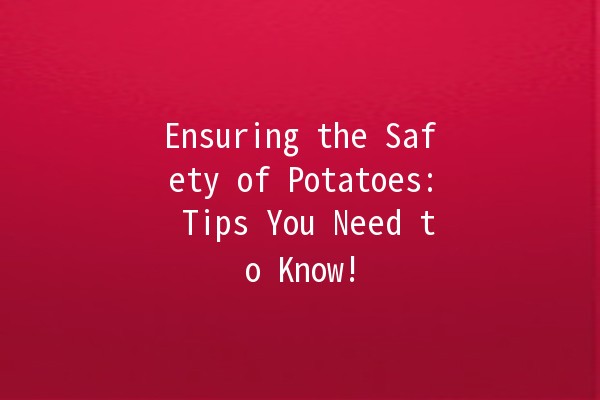Potatoes are a staple food worldwide and are beloved for their versatility and flavor. However, food safety should always be a priority when handling and consuming this popular vegetable. In this article, we will explore the safety measures that ensure potatoes remain healthy for consumption, provide productivityenhancing tips for safe handling, and address some common concerns regarding potato safety.
Understanding Potato Safety
Potatoes can carry potential risks, including exposure to pesticides, bacterial contamination, and improper storage. Knowing how to select, store, and prepare potatoes safely is essential for keeping them healthy. Below are critical aspects of ensuring potato safety throughout their lifecycle:
When buying potatoes, selecting the right ones is crucial. Look for firm, smooth potatoes without dark spots, cuts, or sprouts. Sprouted potatoes can produce solanine, a toxic compound that can cause nausea and even more severe symptoms if consumed in large amounts.
Tip: Always choose organic potatoes when possible to minimize exposure to harmful pesticides. Encourage local farmers' market shopping to support sustainable practices!
Storage conditions play a vital role in potato safety. Potatoes should be stored in a cool, dark, and dry place to prevent sprouting and spoilage. Ideal temperatures for storage range from 45°F to 50°F (7°C to 10°C). Avoid storing potatoes in the refrigerator, as colder temperatures can convert starch to sugar, affecting taste and texture.

Applications:
Store potatoes in burlap sacks, wooden crates, or cardboard boxes to ensure proper air circulation.
Check storage areas regularly, discarding any spoiled potatoes to prevent rot from spreading.
Before cooking, it is essential to wash potatoes thoroughly to remove any dirt or pesticide residues. Potatoes often carry harmful bacteria, like Salmonella or E. coli, which can lead to foodborne illnesses.
Practice:
Use a vegetable brush to scrub the skins under running water, focusing on areas with visible dirt or blemishes.
Rinse in cold water and dry with a clean towel before cooking or peeling.
Cooking with the right temperatures is crucial to ensure safety. Potatoes should generally be cooked to an internal temperature of at least 190°F (88°C) to eliminate bacteria. Techniques such as boiling, baking, or frying can help achieve this temperature.
Example Techniques:
Boiling potatoes for at least 1520 minutes.
Baking whole potatoes for about 4560 minutes at 400°F (200°C).
In today's market, consumers are presented with numerous potato products, such as chips and frozen meals. Always check labels for additives, preservatives, and unhealthy fats, which can negatively impact overall health.
TIP:
Opt for products with minimal processing and familiar ingredients. Choose baked or airfried versions instead of their deepfried counterparts.
Best Practices for Handling Potatoes
Implementing safe handling practices can enhance productivity and ensure that everyone in the household enjoys healthy potatoes. Here are five effective strategies:
Always wash your hands with soap and water for at least 20 seconds before handling food. This basic practice can significantly reduce the risk of contamination.
Application Example:
Establish a habit of washing hands before grocery shopping and before preparing any food in the kitchen.
Prevent crosscontamination by designating one cutting board for raw produce and another for meats. This simple act significantly reduces the risk of spreading harmful pathogens.
Maintain a clean kitchen environment by routinely wiping down countertops and washing utensils after each use. A clean workspace minimizes bacterial spread and maintains potato safety.
Practice Tip:
Use a sanitizing solution or vinegar to wipe down surfaces after potato preparation.
Periodically check the temperature and humidity of your storage areas. Ensure that they align with recommendations for optimal potato preservation.
Example Example:
If using a basement for storage, ensure good ventilation and consider installing a thermometer to monitor conditions.
Sharing knowledge about safe potato handling practices with family members promotes a culture of health and safety in the kitchen. Discussing best practices, identifying spoilage signs, and sharing cooking techniques can help everyone's understanding.
Practical Approach:
Organize cooking sessions where family members can practice washing, cutting, and cooking potatoes safely together.
Common Questions about Potato Safety
Green spots indicate a high level of solanine, which can be harmful if ingested. It is best to peel away any green areas and discard affected portions. If a potato is extensively green or sprouted, it is safer to discard it entirely.
Signs of spoilage include an off smell, soft or mushy texture, and extensive sprouting. If a potato feels overly soft or has visible mold, it is best to dispose of it.
Potato skins are nutritious, but it is essential to ensure they are thoroughly cleaned and cooked. Avoid consuming any skins from green or sprouted potatoes.
Do not wash potatoes before storing them, as moisture can encourage mold growth. Instead, wash them just before cooking or eating.
Spoiled potatoes should be disposed of in a sealed bag to prevent the potential spread of bacteria. If composting, cut them into smaller pieces to expedite the process, ensuring they are properly contained to avoid attracting pests.
Organic potatoes are grown without synthetic fertilizers and pesticides, potentially reducing harmful chemical exposure. However, they still require proper washing and cooking to ensure safety.
The safety of potatoes relies on careful selection, storage, and preparation practices. By adopting sound handling techniques and being mindful of potential risks, you can protect your health while enjoying delicious potato dishes. Remember, safety measures and practical tips can make a difference in ensuring a healthy culinary experience with one of the world's most popular vegetables. Taking these steps seriously is crucial for everyone who appreciates the remarkable potato!